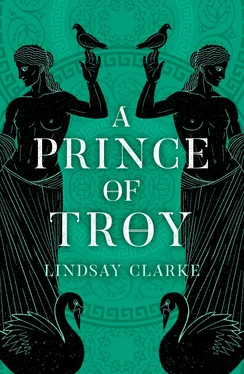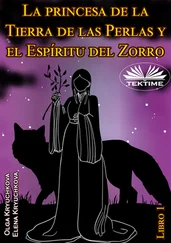By the time he returned to his palace at Iolcus, Thetis was already over two months pregnant. Moody, and still prey to sickness, she at once made it clear that she would have nothing to do with the little mountain woman, whom she dismissed first as her father’s hairy brood-mare, and then, after the cruel pretence of a closer look, as his jaded nag. Peleus protested. There was an unholy row between them that night, and silence for two weeks after.
Then the sickness passed, they talked and made love again, only to resume the queasy truce their life had become. Thetis still refused to include Euhippe among the women of her bedchamber, but the Centaur found an unobtrusive place for herself in the royal household and her medical skills soon won her grateful friends. After successfully treating one woman for a rash around her midriff, and another for a dangerous fever, she gained a reputation as a wise woman and became a great favourite among the Myrmidon barons and their wives. Only Thetis, as her belly grew rounder by the month, continued to ignore her existence.
If she feared that Euhippe had been placed to spy on her, then her fears were justified, for on the occasions when she came to examine his leg, Peleus questioned her closely about anything she had learned of his wife’s activities. For several weeks she found nothing unusual to report, but in the eighth month of Thetis’s pregnancy, Euhippe made friends with a young woman who was complaining of intense pain from her monthly bleeding. Euhippe gave her a potion made up of guelder rose, skullcap and black haw for immediate relief, and advised her to return soon for further treatment. When she came back, they began to chat, and it emerged that the girl served as a handmaid in the cuttlefish cult. Through cautiously worded questions, Euhippe learned that there had been nothing outwardly wrong with any of Thetis’s babies – no fevers or defects, nothing that would account for their early death. It was a mystery, the girl said, unless the Goddess had called them back to her.
When Euhippe asked her casually about Harpale’s role in the cult, the girl flushed a little, looked away, and said that her own degree was lowly and she was too young to be initiated into such matters. Nor was she prepared to speculate.
‘But there was a smell of fear about her,’ Euhippe decided. ‘She may not know much, but she knows more than she was letting on, and it frightens her.’
With his own suspicions now confirmed, Peleus asked Euhippe to keep her ears open, and eventually more emerged through one of the baron’s wives. It was this woman who first dared to speak of witchcraft, but she did so darkly, casting her suspicions only on the Dolopian, not on Thetis herself, and in a way that left Euhippe feeling the woman meant her to report what she said.
Knowing that Thetis had once offended this woman, Peleus suggested that she might be spreading rumours out of spite, but Euhippe merely shrugged.
‘You truly believe that something terrible is happening?’ he demanded.
‘For you it would be terrible,’ she said.
‘Do you know what it is?’
‘I may be wrong.’
‘Tell me anyway.’
Euhippe thought for a moment, then shook her head.
‘Then what am I to think,’ he demanded, ‘what am I to do?’
‘You need do nothing. Not until the baby is born.’
‘And then?’
‘Let us wait in patience. When the time comes we will see what to do.’
The truth of what happened at that time was known only to Peleus himself and he would not speak of it – not, that is, until some six years later when Odysseus arrived at his court for the first time. By then the child – Peleus’s seventh son, and the only one to survive – was already in the mountains with Cheiron, learning how to live. Peleus lived alone in his gloomy palace under the patient, mostly silent care of Euhippe, and for a time his melancholic condition had been the talk of Argos. Telamon and Theseus had both tried to shake him out of it and failed. Cheiron was too old to come down from the mountains, and Peleus lacked the heart to seek him out. So the King of the Myrmidons wasted in his loneliness, limping from hall to chamber, hardly speaking, and increasingly reliant on trusted ministers to handle the affairs of state. Old friends like Pirithous and Theseus died. Power shifted south to Mycenae. People began to forget about him.
Then Odysseus ran his ship ashore on the strand at Iolcus. King Nestor of Pylos had encouraged him to come. Everyone responded to the lively young prince of Ithaca, he’d said – perhaps old Peleus might. ‘Why not see if you can’t tempt him to join you in your raid along the Mysian coast. Peleus was a good pirate in his day. He might be so again.’
There was, Odysseus quickly saw, no chance of it. The man could barely lift a smile let alone a sword. Shrugging his shoulders, he had made up his mind to cut his losses and push off at dawn, when Peleus looked up from his wine-cup for the first time in nearly an hour and said, ‘It was good of you to come. Everyone has forgotten how to smile around me. You seem to do little else.’
‘It costs me nothing,’ Odysseus smiled. ‘Does it disturb you?’
Unsmiling, Peleus shook his head. After a time he began to talk and a god must have entered him, for once he began it became unstoppable. That night witnessed a huge unburdening because Odysseus was the only person to whom Peleus ever spoke about what happened between himself and his wife. Odysseus listened in spellbound horror to a tormented account of how, at the prompting of Euhippe, he had cleansed himself before Zeus, begged forgiveness of the Goddess, and broken in to the sacred precinct around the sea-cave where Thetis held her rites. It was the dark of the moon after the birth of the child. Pushing aside the drug-intoxicated women who tried to stop him, Peleus entered the cave and saw the dark figures of Thetis and Harpale standing under a primitive wooden idol to the Goddess beside an altar of burning coals. Harpale held a finely meshed net of mail. Thetis was unwrapping the swaddling bands from her howling baby, and Peleus saw at once what they intended to do. If he had he not come in time to prevent it, she and Harpale would have done what they must have done many times before – they would have seined the child with fire, passing its tiny body back and forth along the shimmer of hot air above the altar’s glowing coals until it was immortalized.
With a howl of execration, Peleus drew his sword, cut Harpale down where she stood, and snatched the baby from its screaming mother. Had the child not been squalling in his grip like a small storm, he might have killed Thetis also, but by the time he could lift the sword again the frenzied moment had passed and he could not bring himself to do it. Thetis saw the conflict in his face. Astoundingly, she released a small, frustrated laugh.
With the baby tussling in his arm, he stared at her as at a mad woman. She held his gaze, and they stood unmoving in the heat and sea-smell of the cave, knowing that the infant might have been spared its flames, but the fire that Thetis had lit had instantly consumed all traces of their love for one another.
Heart-broken, and unwilling to command the death of Cheiron’s daughter, Peleus had her kept under close confinement for a time. The child he gave to a wet-nurse, one of Euhippe’s friends, a Centaur woman who had been brought back from a hunt, freed at Peleus’s insistence, and now lived with one of the palace cooks. It was she who named her tiny charge Achilles, the lipless one, because his lips had never been warmed into life at his mother’s breast. But Peleus found it hard even to look at his son because the child’s cries always recalled the horror of that night. On one thing, however, he was resolved – that Thetis should never come close either to the child or to himself. So in the end, on the understanding that she would die if ever she returned to Thessaly, he gave her leave to do what she had always wished to do and Thetis joined her mother’s people on the remote island of Skyros.
Читать дальше












